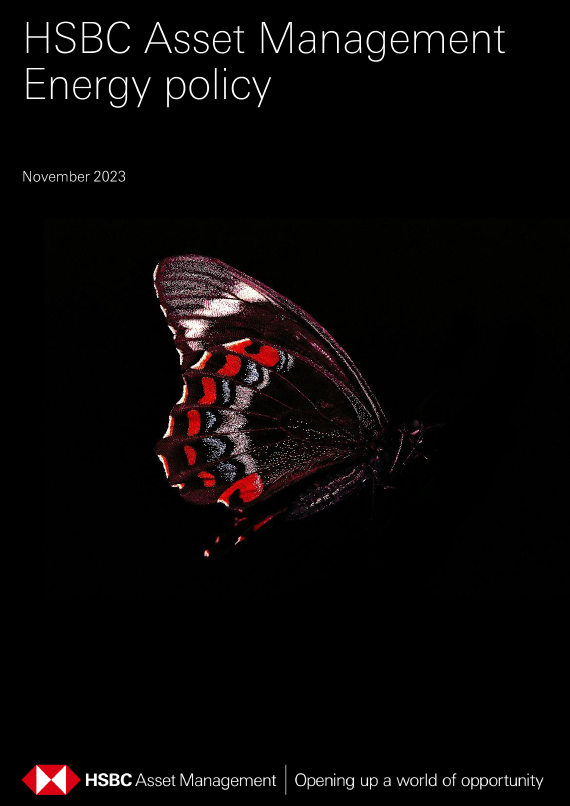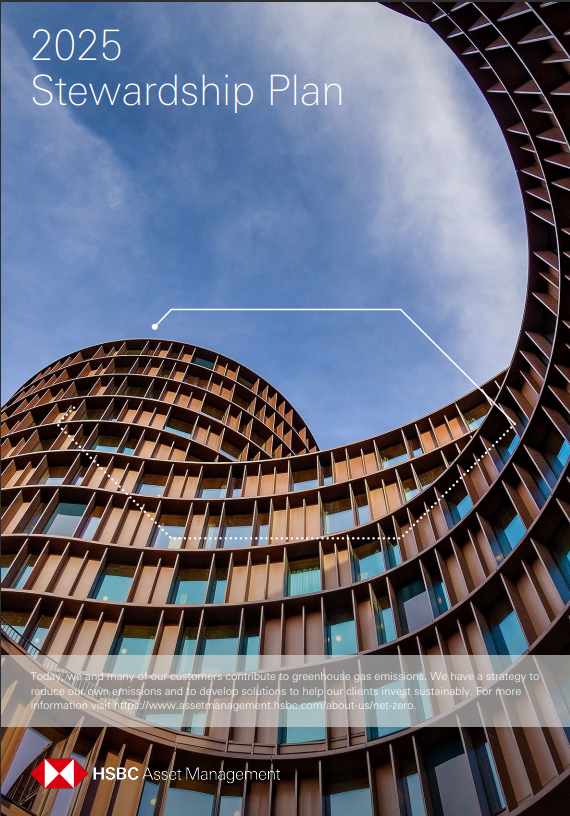Policies and Disclosures
Our Responsible Investment policies have been developed to guide our investment and engagement activities, and to support us in fulfilling our commitments to clients and regulators. We may over time update, consolidate, or withdraw certain policies and documents, as our approach to responsible investment evolves.
Article 4 - Statement on principal adverse impacts of investment decisions on sustainability factors
Summary
HSBC Investment Funds (Luxembourg) S.A., (LEI - 213800KNC1J1NJ1IYR95) considers principal adverse impacts (PAIs) of its investment decisions on sustainability factors. The present statement is the consolidated statement on PAIs on sustainability factors of HSBC Investment Funds (Luxembourg) S.A.
This statement on PAIs on sustainability factors covers the reference period from 1 January 2024 to 31 December 2024.
We recognise that sustainability risks can lead to outcomes that have negative impacts on the value of the financial products. We therefore aim to incorporate material sustainability issues in our investment process as well as seeking to mitigate negative impacts. We support the UNGC principles and have developed policies and statements on Banned Weapons, Thermal Coal and Energy as part of our responsible investment framework, that further outline our approach including how we integrate associated risks and opportunities, our engagement focus and collaborative activities. Details are on our website. https://www.assetmanagement.hsbc.lu/en/professional-clients/about-us/responsible-investing/policies
Where a product considers principal adverse impacts on sustainability factors, their prioritisation depends on the sustainable objectives or E and S characteristics of the product.
These policies apply equally when we act as either a financial market participant (investment manager) or financial adviser. They have been approved and are kept under review by our HSBC Global Asset Management Ltd Sustainability Forum - which included our global CEO, CIO, Heads of Risk, Legal and Sustainability - as follows: Banned Weapons (December 2024), Energy (December 2024) and Thermal Coal (December 2024). The investment function was responsible for the implementation of these policies, overseen by our Asset Class ESG Committee and the ESG Investment Committee. Their implementation draws upon a range of data sources to inform the integration of ESG factors into our investment process and assessment of principal adverse impacts. These include MSCI, ISS, S&P Trucost, Bloomberg and Sustainalytics. We recognise that data reliability and availability may vary across impact indicators and regions. Addressing this may take time as requirements for disclosure of underlying data differ across markets and types of issuer, and standardisation of disclosure is not inevitable. We also leverage our global investment analyst network and engagement activities to inform our evaluation of the risks of adverse impact in our investment. We have selected indicators to identify and assess PAIs to reflect data sources we use in our own investment processes and/or the data available to market participants in a consistent and comparable format with sufficiently broad coverage.
As a large asset manager, offering a range of active and passively managed products, relevant PAI indicators will be included in our investment process through integration, engagement and/or exclusion.
For our investment products, PAI indicators will be reflected in portfolio construction through screening, tilting and other techniques.
For our sustainable investment definition under the Regulation, relevant PAIs are considered amongst Do No Significant Harm criteria.
We explain our approach to voting at company meetings in our Voting Guidelines; companies or issuers which do not adequately manage PAIs may face voting sanctions. Due to lack of data availability, Private Assets (such as Private Debt) are not included in this PAI statement, however if data becomes available in the future those will be included. Our Engagement Policy sets out our approach to engagement, including escalation of engagement where companies or issuers do not respond adequately to concerns raised regarding adverse impacts.
We give further details on our expectations for companies or issuers in their management of adverse impacts in our Stewardship Plan. Our Stewardship Plan sets out our approach to engagement, including escalation of engagement where companies or issuers do not respond adequately to concerns raised regarding adverse impacts.
We give further details on our expectations for companies or issuers in their management of adverse impacts in this Plan.
Further details of our approach for screening, investment process and engagement are set out in specific policies and commitments, including Banned Weapons, Energy and Thermal Coal.
On climate change issues in particular, the net zero ambition and interim emissions reduction target of HSBC Global Asset Management Limited, the lead entity for the HSBC Asset Management business are the most important expression of our ambition.
The Consolidated Statement and all of the policies mentioned are available further down this page.
The net zero interim emissions reduction target is available at: On the road to net zero
Article 3 - Transparency of sustainability risk policies
Our Purpose is to help our stakeholders prosper – our clients, shareholders, the societies in which we operate, and our planet. We aim to deliver value by focussing on clients’ investment needs, delivering on our philosophy of investment excellence and supporting the transition to a sustainable future.
HSBC Asset Management is committed to be a leader in responsible investment. This means our investment decisions as a Fund Manager take account of material environmental, social and corporate governance (ESG) risks. If ESG risks are not managed well by the companies and Governments we invest in this could impact their profitability and therefore the investment returns for our clients. As we only provide guidance as a Financial Adviser to investors in our own funds, the guidance we provide already factors in the ESG risks our fund managers have considered.
Our Responsible Investment Policy outlines our approach to responsible investing, focussing on the ten principles of the UN Global Compact (UNGC). The UNGC sets out key areas of non-financial risk: human rights, labour, environment and anti-corruption. We use third party screening providers to identify companies with a poor track record in these areas and, where potential non-financial risks are identified, we also carry out our own due diligence.
We also consider it our responsibility to be active, long-term stewards of the businesses we invest in on behalf of our clients. We meet with companies we invest in regularly as part of our on-going monitoring. This helps us to:
- improve our understanding of their business and strategy;
- signal support or concerns we have with management actions; and
- communicate with them to clearly explain our expectations and objectives.
We recognise collaborative engagement as an effective tool to promote change, in particular where individual investor action may be less effective. We therefore participate in investor-led joint engagement initiatives that align with our thematic priorities and holdings especially where we believe we can have a positive influence in improving the companies in which we invest.
We strongly believe in the impact and effectiveness of engagement in improving corporate practices. However, we recognise that in some cases engagement is unlikely to be successful or the risk in holding the company is too great. If we see that our engagement with the companies we invest in is not delivering sufficient progress in reducing sustainability risks, we apply selective exclusions and review them on an ongoing basis.
Finally, we believe transparency and disclosure are an integral part of good governance. We expect it from the companies we invest in because it allows us to make better-informed investment decisions but we believe it is equally as important for us to be transparent with our clients and relevant stakeholders and to communicate with them clearly.
Policies
|
|
|
||
|
|
|
|
|
|
|
|
|
|
|
|
|
Annual Reports
|
|
Change Log
| Date |
Change |
| December 2025 | Update of the Responsible Investing and banned weapons policies |
| November 2025 | Update of the Energy and Coal policies |
| February 2025 | Green Impact Investment Guidelines and Stewardship and Conflict of Interest removed from website |
| December 2024 | Energy Policy, Thermal Coal Policy, Responsible Investment Policy, Alternatives Responsible Investment Policy updated. Biodiversity and Climate Change Policies withdrawn; commitments to Finance for Biodiversity Pledge (biodiversity) and Net Zero Asset Managers initiative (climate change) still reflected in Responsible Investment Policy. |
| June 2024 | 2023 Statement on Principal Adverse Impacts of Investment Decisions on Sustainability Factors for HSBC Investment Funds (Luxembourg) S.A. published |
| March 2024 | Responsible Investment Policy, Alternatives Responsible Investment Policy, Global Voting Guidelines and Responsible Investment Review updated |
| November 2023 | Energy Policy newly published and Coal Policy updated |
| September 2023 | Responsible Investment Implementation Procedures removed from website |
| July 2023 | User Guide on Principal Adverse Indicators newly published and Sustainable Investment Methodology updated. The HSBC Investment Funds (Luxembourg) S.A. Entity report (Article 4) from 30 June 2023 has been re-published on the website, as we adjusted the calculation in PAI 5a, PAI 9 & PAI 16 and the data in PAI 6 & PAI 12. These figures have therefore been updated within the report. To accommodate these changes we have also amended the explanation in PAI 6 (coverage) & PAI 9 (with regard to the explanation of the calculation methodology). The explanation for PAI 13 has also been slightly modified. |
| June 2023 | Biodiversity Policy, Banned Weapons Policy, Climate Change Policy, Global Voting Guidelines, Responsible Investment Policy and Responsible Investment Implementation Proceduresupdated during annual review. |
| January 2023 | Sustainable Investment Methodology newly published and Article 4 disclosure updated |
| September 2022 | Coal Policy and Alternatives Responsible Investment Policy newly published |
| August 2022 | Green Impact Investment Guidelines updated |
| June 2022 | Responsible Investment Implementation Procedures, Biodiversity Policy, Banned Weapons Policy, Climate Change Policy and Global Voting Guidelines updated during annual review |
| January 2022 | Responsible Investment Policy updated during annual review |










